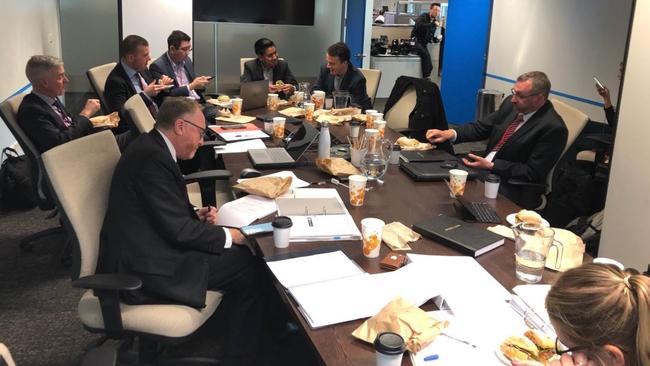NACC bill must offer more protection for journalists, says media coalition
Australia’s major media outlets have expressed alarm about the lack of adequate protections for journalists and their sources under the proposed national anti-corruption commission, with the issue of search warrants of particular concern.
Australia’s major media outlets have expressed alarm about the lack of adequate protections for journalists and their sources under the proposed national anti-corruption commission, with the issue of search warrants of particular concern.
Australia’s Right to Know coalition – whose signatories include Nine, Seven, Ten, News Corp (publisher of The Australian), the Guardian, AAP, public broadcasters ABC and SBS, as well as industry trade union the Media Entertainment and Arts Alliance – lodged a submission last Friday to the parliamentary committee that is reviewing the NACC bill.
While the group’s submission broadly welcomes the federal government’s recognition of the need for stronger protections for journalists’ sources, the ARTK coalition strongly objects to the bill’s lack of provision for media outlets to contest the application for search warrants issued on newsrooms and reporters’ homes.
The push for contested warrants has been one of the core priorities for the ARTK group since it was formed in 2007.
In June 2019, court-approved warrants were issued (without the prior knowledge of media outlets) for raids on the home of a News Corp political journalist, and the ABC’s Sydney newsroom. The raids, which were conducted only a day apart, related to separate news investigations and took place long after the publication of the stories.

The police raids were perceived to be intimidatory towards both whistleblowers and journalists, but since then there have been no changes to the federal laws that prevent the media from challenging warrants that compromise reporters’ freedoms to pursue matters of public interest, and to protect their sources.
Various state parliaments have, in recent years, offered some protections for journalists but there are holes in the laws – for example, phone records of individual reporters and entire media organisations can still be accessed in secret to discover their sources, a process that disregards journalists’ ethical obligations.
Last week, Attorney-General Mark Dreyfus conceded that politically appointed members of the Administrative Appeals Tribunal could sign off on warrants for anti-corruption investigators to tap the phones of prime ministers and senior public servants.
But he opened the door to changing the legislation so that it required a senior judge to approve warrants involving journalists.
“I’m on record as promoting the idea that you need senior people looking at these particular kinds of warrants … I would hope (it) to be a very small number of compulsory powers ever used connected to a journalist. You can’t rule it out.”
MEAA’s federal media president Karen Percy told The Australian, “MEAA is encouraged to see that the bill addresses the need for greater protection of whistleblowers and the journalists who are telling their stories”.
“Over decades it is journalists who have exposed corruption and wrongdoing in our politics and our governments. So many royal commissions, parliamentary inquiries have been launched off the back of brave journalists and their sources.
“Journalists are ethically obliged to protect their sources and while there have been some attempts to enshrine this in law, there are inconsistencies across jurisdictions and there are still too many legislative holes that expose journalists to fines or jail. We need to see uniform shield laws so that journalists across the country have the same protections.
“We also need to ensure that media organisations and journalists can challenge warrants demanding information about sources, or other data and material that journalists hold. The current regime is secretive and is open to abuse.
“Too often our national security laws are used to shut down public scrutiny.
“We welcome a robust discussion that truly understands the importance that journalists and whistleblowers play in uncovering dishonesty.”
On its website, the ARTK outlines the suite of legislative reforms it is pursuing.
The right to contest the application for warrants for journalists and media organisations is one of the central aims, along with exemptions for reporters from laws (including security laws) that would put them in jail for doing their jobs.
The website also states: “Public sector whistleblowers must be adequately protected – the current law needs to change. A new regime that limits which documents can be stamped secret; a properly functioning freedom of information (FOI) regime; and defamation law reform.”
The NACC committee is due to report on or before November 10.





To join the conversation, please log in. Don't have an account? Register
Join the conversation, you are commenting as Logout